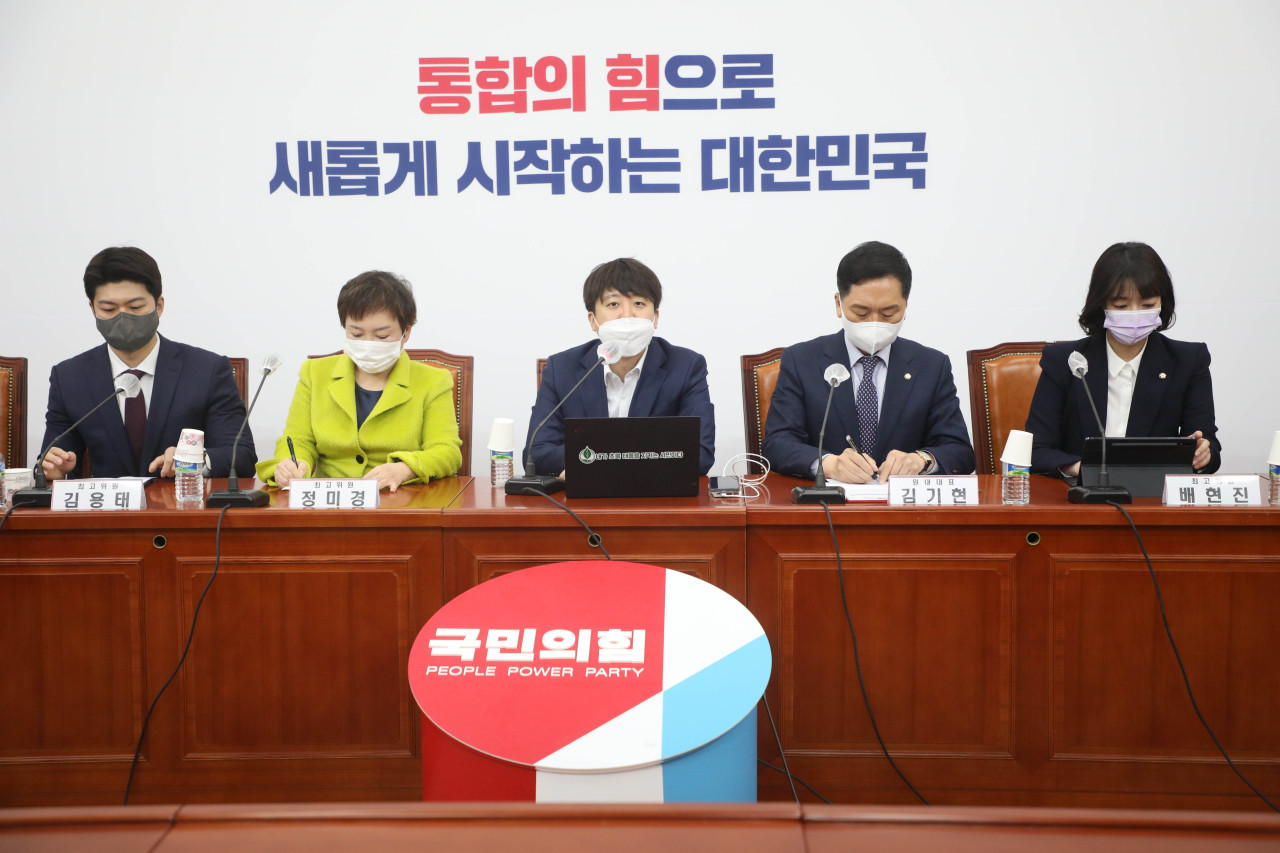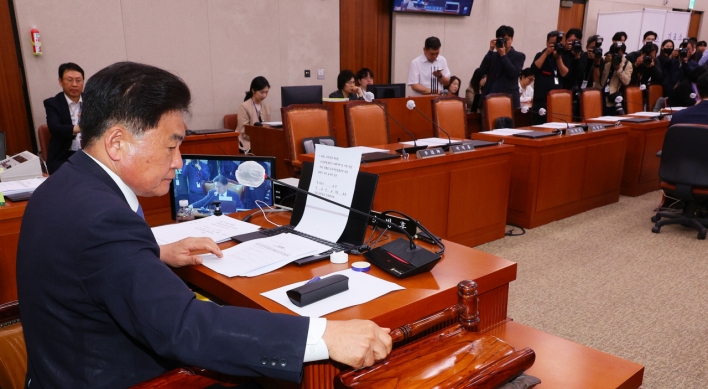Finger pointing and infighting seen in victorious People Power Party
Discord over policies and leaders noted by observers
By Ko Jun-taePublished : March 24, 2022 - 14:22

With less than 70 days remaining until the local elections, finger pointing and infighting are brewing inside the conservative People Power Party even after its victory in the latest presidential election.
The internal feud comes as core members of the People Power Party clash with traditional conservative faction heavyweights on how the government should run under President-elect Yoon Suk-yeol and how the party should prepare to make nominations and devise strategies for the upcoming local elections.
Traditional figures for the conservative faction have expressed the need for close aides of Yoon who helped much in his presidential campaign should leave Yoon to form the Cabinet without them in striving to assemble a coalition government.
Kim Moo-sung, former chairman of the Saenuri Party, said the closest allies of Yoon like Kwon Sung-dong and Rep. Chang Je-won should stay out of touch with Yoon until after the works of the presidential transition committee are finalized, so that the Yoon administration can form a politically neutral Cabinet in leading the minority government.
"For the Yoon Suk-yeol administration to succeed, a politically neutral Cabinet should be formed in the situation of minority government, and People Power Party officials should yield," Kim said in an event he participated Saturday.
"I believe the dynamics in the parliament can be shifted in the 22nd parliamentary elections only if Yoon Suk-yeol administration starts off smoothly."
Some even asked People Power Party leadership to step down and let new figures take over and devise strategies for the upcoming local elections and discuss ways to fulfill the merger promise with the minor centrist People's Party.
Even though Yoon Suk-yeol won the presidential race, "the party leadership has done its task of overturning the regime, so a new leadership should be formed for the local elections to match the pace of the new government," said Lee Jae-oh, a senior adviser for the People Power Party, said in a radio interview last week.
"The party also has to discuss its merger with the People's Party, so either it can draft new leaders or form an emergency steering committee to finalize the merger deal."
People Power Party Chairman Lee Jun-seok and People's Party Chairman Ahn Cheol-soo, who now serves as the head of the presidential transition committee for Yoon, was scheduled to meet this week to discuss the merger.
After the party won the presidential election by the smallest margin in South Korean history, a feud immediately erupted over whether Lee Jun-seok is responsible for making the election too close when most public surveys favored Yoon easily prevailing over his rival from the Democratic Party.
Many then asked Lee Jun-seok to resign to assume responsibility for making problematic comments near the end of the race, but these calls died down in a matter of days after the party chairman made clear he would not let go of his top spot at least until the end of the local elections.
Even as Yoon pushed to fulfill some of his major campaign promises before starting his term in May, discord was apparent within the People Power Party, as many of its members expressed discomfort and voiced against Yoon’s ideas.
Some People Power Party members explicitly expressed opposition to Yoon's idea of abolishing the Ministry of Gender Equality and Family, and others spoke out against Yoon's idea to relocate the presidential office to the Defense Ministry compound in Yongsan-gu, central Seoul, before starting his term.
The feud continued as the conservative party started contemplating who to pick as its flagbearers for the local elections, especially with deciding a nominee to run for the Daegu mayoral post.
The People Power Party on Monday adopted a resolution to put a 10 percent penalty for incumbent lawmakers looking to run in the local elections and another 15 percent penalty for those who had relinquished party membership to run as independent candidates in the past five years.
The resolution was essentially targeting Rep. Hong Joon-pyo, who publicly announced to run for the Daegu mayoral post in June as a flagbearer of the People Power Party.
Hong had successfully run for a lawmaker seat in the 2020 parliamentary elections as an independent candidate in Daegu after relinquishing his party membership the same year. He returned to the party 16 months later in an unsuccessful bid for presidency.
Hong explicitly blamed Kim Jae-won, a senior official with the People Power Party, for passing the resolution, as Kim also announced his intent to run for the Daegu mayoral post against him. In turn, Kim blamed Lee Jun-seok for the resolution, saying the party chairman was the first to suggest penalties levied on select figures including Hong.
Lee Jun-seok immediately refuted Kim’s claim, saying he has always voiced against levying any penalties for any members within the party. Since then, the two have been caught in a finger-pointing battle of words over who is to blame for the resolution blatantly thwarting Hong’s chances in the local elections.
The People Power Party is preparing to finalize composing its nomination committees for all regions by April 4.
The internal feud comes as core members of the People Power Party clash with traditional conservative faction heavyweights on how the government should run under President-elect Yoon Suk-yeol and how the party should prepare to make nominations and devise strategies for the upcoming local elections.
Traditional figures for the conservative faction have expressed the need for close aides of Yoon who helped much in his presidential campaign should leave Yoon to form the Cabinet without them in striving to assemble a coalition government.
Kim Moo-sung, former chairman of the Saenuri Party, said the closest allies of Yoon like Kwon Sung-dong and Rep. Chang Je-won should stay out of touch with Yoon until after the works of the presidential transition committee are finalized, so that the Yoon administration can form a politically neutral Cabinet in leading the minority government.
"For the Yoon Suk-yeol administration to succeed, a politically neutral Cabinet should be formed in the situation of minority government, and People Power Party officials should yield," Kim said in an event he participated Saturday.
"I believe the dynamics in the parliament can be shifted in the 22nd parliamentary elections only if Yoon Suk-yeol administration starts off smoothly."
Some even asked People Power Party leadership to step down and let new figures take over and devise strategies for the upcoming local elections and discuss ways to fulfill the merger promise with the minor centrist People's Party.
Even though Yoon Suk-yeol won the presidential race, "the party leadership has done its task of overturning the regime, so a new leadership should be formed for the local elections to match the pace of the new government," said Lee Jae-oh, a senior adviser for the People Power Party, said in a radio interview last week.
"The party also has to discuss its merger with the People's Party, so either it can draft new leaders or form an emergency steering committee to finalize the merger deal."
People Power Party Chairman Lee Jun-seok and People's Party Chairman Ahn Cheol-soo, who now serves as the head of the presidential transition committee for Yoon, was scheduled to meet this week to discuss the merger.
After the party won the presidential election by the smallest margin in South Korean history, a feud immediately erupted over whether Lee Jun-seok is responsible for making the election too close when most public surveys favored Yoon easily prevailing over his rival from the Democratic Party.
Many then asked Lee Jun-seok to resign to assume responsibility for making problematic comments near the end of the race, but these calls died down in a matter of days after the party chairman made clear he would not let go of his top spot at least until the end of the local elections.
Even as Yoon pushed to fulfill some of his major campaign promises before starting his term in May, discord was apparent within the People Power Party, as many of its members expressed discomfort and voiced against Yoon’s ideas.
Some People Power Party members explicitly expressed opposition to Yoon's idea of abolishing the Ministry of Gender Equality and Family, and others spoke out against Yoon's idea to relocate the presidential office to the Defense Ministry compound in Yongsan-gu, central Seoul, before starting his term.
The feud continued as the conservative party started contemplating who to pick as its flagbearers for the local elections, especially with deciding a nominee to run for the Daegu mayoral post.
The People Power Party on Monday adopted a resolution to put a 10 percent penalty for incumbent lawmakers looking to run in the local elections and another 15 percent penalty for those who had relinquished party membership to run as independent candidates in the past five years.
The resolution was essentially targeting Rep. Hong Joon-pyo, who publicly announced to run for the Daegu mayoral post in June as a flagbearer of the People Power Party.
Hong had successfully run for a lawmaker seat in the 2020 parliamentary elections as an independent candidate in Daegu after relinquishing his party membership the same year. He returned to the party 16 months later in an unsuccessful bid for presidency.
Hong explicitly blamed Kim Jae-won, a senior official with the People Power Party, for passing the resolution, as Kim also announced his intent to run for the Daegu mayoral post against him. In turn, Kim blamed Lee Jun-seok for the resolution, saying the party chairman was the first to suggest penalties levied on select figures including Hong.
Lee Jun-seok immediately refuted Kim’s claim, saying he has always voiced against levying any penalties for any members within the party. Since then, the two have been caught in a finger-pointing battle of words over who is to blame for the resolution blatantly thwarting Hong’s chances in the local elections.
The People Power Party is preparing to finalize composing its nomination committees for all regions by April 4.











![[Kim Seong-kon] Democracy and the future of South Korea](http://res.heraldm.com/phpwas/restmb_idxmake.php?idx=644&simg=/content/image/2024/04/16/20240416050802_0.jpg&u=)







![[Today’s K-pop] Zico drops snippet of collaboration with Jennie](http://res.heraldm.com/phpwas/restmb_idxmake.php?idx=642&simg=/content/image/2024/04/18/20240418050702_0.jpg&u=)